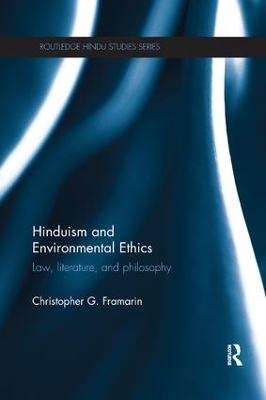
Hinduism and Environmental Ethics
Routledge (Verlag)
978-0-8153-6808-3 (ISBN)
This book argues that the standard arguments for and against the claim that certain Hindu texts and traditions attribute direct moral standing to animals and plants are unconvincing. It presents careful, extensive, and original interpretations of passages from the Manusmrti (law), the Mahābhārata (literature), and the Yogasūtra (philosophy), and argues that these texts attribute direct moral standing to animals and plants for at least three reasons: they are sentient, they are alive, and they possess a range of other relevant attributes and abilities.
This book is of interest to scholars of Hinduism and the environment, religion and the environment, Hindu and/or Buddhist philosophy more broadly, and environmental ethics.
Christopher G. Framarin is Associate Professor in the Department of Philosophy and Department of Religious Studies at the University of Calgary, Alberta, Canada. He is the author of Desire and Motivation in Indian Philosophy, also published by Routledge.
Introduction 1. A Plausible Environmental Ethic 2 Instrumentalist Interpretations 3. Interconnectedness Interpretations 4. Sameness Interpretations 5. The Moral Standing of Animals and Plants in the Manusmrti 6. The Moral Standing of Animals and Plants in the Mahābhārata, Part I: The Burning of the Khāndava Forest 7. The Moral Standing of Animals and Plants in the Mahābhārata, Part II: The Dialogue on Vegetarianism and Ahimsā in the Anuśāsanaparvan 8. The Moral Standing of Animals and Plants in the Yogasūtra 9. Conclusion
| Erscheinungsdatum | 29.10.2017 |
|---|---|
| Reihe/Serie | Routledge Hindu Studies Series |
| Verlagsort | New York |
| Sprache | englisch |
| Maße | 156 x 234 mm |
| Gewicht | 453 g |
| Themenwelt | Geisteswissenschaften ► Religion / Theologie ► Hinduismus |
| ISBN-10 | 0-8153-6808-9 / 0815368089 |
| ISBN-13 | 978-0-8153-6808-3 / 9780815368083 |
| Zustand | Neuware |
| Haben Sie eine Frage zum Produkt? |
aus dem Bereich


